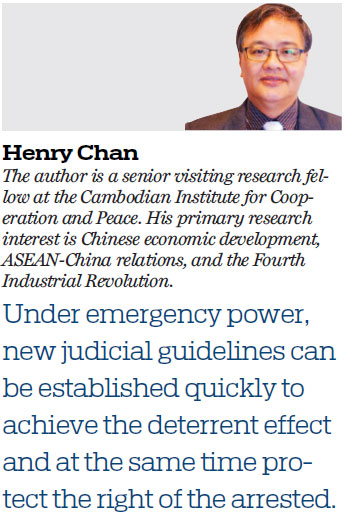New rules, community support needed to resolve crisis
Updated: 2019-10-25 07:35
(HK Edition)
|
|||||||||
The extradition bill withdrawal and social dialogue offer extended by Chief Executive Carrie Lam Cheng Yuet-ngor on Sept 4 failed to convince the radical demonstrators to stop the violence that has beset the city since the June 9 mass protest march against the bill. On the contrary, the scale and intensity of vandalism and violence over the weekend preceding the Oct 1 National Day holiday and on the day itself was the worst in the four months of anti-government rioting. The instability brought on by the chaos has hurt the economy badly, and tens of thousands of jobs are on the line following the unprecedented collapse of the retail and tourism sectors. The call for more resolute measures to arrest the anarchy, restore order and save the city is getting louder after the National Day mayhem.

The front-line police officers represented by the Junior Police Officers' Association and Hong Kong Police Inspectors' Association openly clamored for more emergency power to deal with the escalating violence, and lamented the absence of concrete political measures to solve the current impasse. The government's key allies in the Legislative Council - the Federation of Trade Unions, and the Democratic Alliance for the Betterment and Progress of Hong Kong - also supported the two police associations' proposals and asked for stricter laws to tackle the crisis.
In response, the government invoked the Emergency Regulations Ordinance on Oct 4 and promulgated the Prohibition on Face Covering Regulation. The ban, which took effect on Oct 5, bars people from concealing their faces, whether with a mask or paint, while attending any public gathering of more than 50 participants, any procession of more than 30 people, or any unlawful assembly. Offenders face a maximum fine of HK$25,000 ($3,200) and imprisonment for up to one year.
Face masks have become de rigueur among Hong Kong protesters to protect against tear gas and to conceal their identities. The government said the measure is aimed at making it easier to identify protesters who resort to violence, and protesters have vowed to defy the law. It is not easy to implement the law, taking note of the condition on the ground, and very few people expect that the anti-mask law alone can deter the radicals and quell the street violence, as was shown in the latest anti-government gatherings.
To effectively meet the open challenge to the anti-mask ban, instituting and implementing other complementary rules to deter violence must be part of the plan to restore order. Many in the public lamented that the current judicial guidelines on bail and sentencing rioters unreasonably place the entire burden to restore order on the overstretched police force. The vernacular that "police arrest, judges release" reflects the public's poor perception of the police-prosecutor-court trinity central to maintaining public order. Under emergency power, new judicial guidelines can be established quickly to achieve the deterrent effect and at the same time protect the right of the arrested as the guidance issued can be set to conform to accepted international legal norms on similar offenses. Looking into supplementary measures to use the emergency law is both an art and a science. It will test the political skills of the Hong Kong government and its judicial advisers.
The demonstrators had successfully lobbied the US House of Representatives to pass the Hong Kong Human Rights and Democracy Act of 2019 last week, and the Senate is likely to pass a similar version soon. The act will hurt the Hong Kong government's effort to restore order in the streets as it targets the Hong Kong law enforcement officials suspected of human rights violations.
The situation today is dynamic, and how soon Lam can restore order in the streets and proceed with social dialogue to restore peace and normalcy and renew momentum to the city will test her resolve and skill as a leader. The government has taken the stand that keeping public order is its foremost policy objective with the imposition of the mask ban. The extremist rioters are not likely to sit back and not try to re-energize its movement with more militant actions. The moment of truth is dawning, and the situation on the ground could be grim for some time.
Winning the support of the silent majority and convincing the public that the government is tackling head-on the convoluted problems of housing, the wealth gap, social justice and lack of opportunities for young people will ultimately decide the outcome of the prolonged struggle. The key to success will be for the silent majority to speak up in condemnation of anarchists who have so far succeeded in sugarcoating their campaign of indiscriminate destruction and violence by claiming to fight for freedom and democracy. They have succeeded so far because many of them are adept at exploiting social media, which the government must counter with a comprehensive program. The police force alone, brave as it is, cannot win the hearts and minds of the people. They need the vocal support of ordinary citizens. Fence-sitting is no longer an option if Hong Kong is to overcome its greatest challenge since the handover.
(HK Edition 10/25/2019 page12)